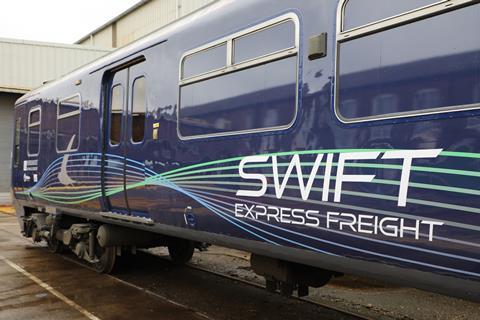
UK: Four Class 321 electric multiple-units are to be converted to carry light goods with the aim of offering a fast, cost-effective and low carbon alternative to lorries and vans. A prototype for the Swift Express Freight concept was unveiled earlier this year, and an agreement for the conversion of a further four units was announced by leasing company Eversholt Rail on November 19.
Eversholt said an ‘ever-increasing number’ of train operators are seeking to capitalise on supply chain issues including the HGV driver shortage, and it expects to agree a lease for the four units by the end of 2021.
Wolverton-based rolling stock maintenance and upgrading company Gemini Rail Services is to begin the conversion work this month, for delivery from February 2022.
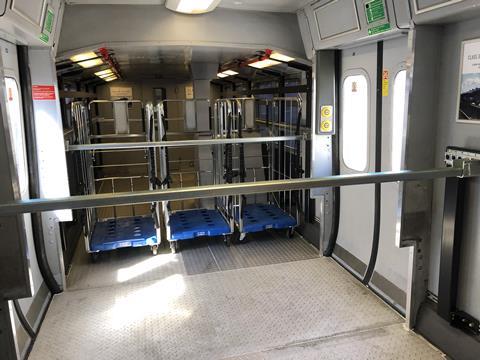
The seats will be removed and new flooring fitted, along with Titan sidewall and floor rails, a logistics industry standard system widely used for securing roll cages inside lorries and vans.
In changes from the demonstrator train which was unveiled in July, the four units will also have their toilets removed and the GSM-R and On-Train Monitoring Recorder equipment relocated outside the loading space to provide additional capacity.
‘The logistics industry is facing delivery and environmental challenges that Swift Express Freight can alleviate’, said Paul Sutherland, Client Services Director at Eversholt Rail. ‘The agreement to convert four Swift units will build on the current momentum and enable an operator to showcase the full spectrum of benefits on offer — we look forward to seeing the units in service and supporting the growth of the concept in 2022.’
Conversion
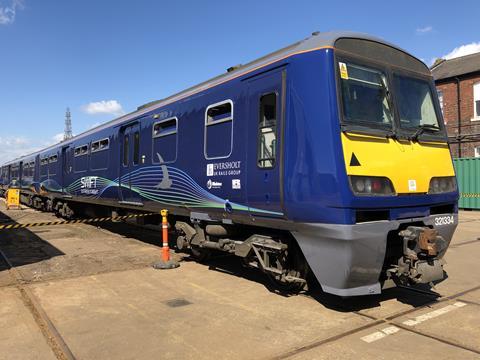
Swift Express Freight was developed as a speculative venture by Eversholt, engineering firm Ricardo and Wabtec, which converted the demonstrator unit at its Doncaster site.
Two factors lay behind the decision to undertake the project, Sutherland told Rail Business UK at the unveiling of the demonstrator in July. One was the possibility of finding a new use for EMUs which had come off-lease at Greater Anglia, and the second was freight operators’ interest in the growing market for fast deliveries.
Eversholt began initial studies in 2019, and the project was given a ‘real shove’ by the coronavirus pandemic, which saw consumers switching to online shopping, a change which brought an increase in demand for fast deliveries and is expected to be largely permanent.
The Class 321s were built in the 1980s, are relatively simple units and are structurally sound. Their kinematic envelope and EMC performance enables operation almost anywhere on the 25 kV 50 Hz network, and they have a lot of commonality with other classes from the same era.
As a result they are well understood within the rail industry and supported by an established supply and maintenance chain.
A four-car set has a similar capacity to four large lorries, which are shorter but wider. The main constraint is the train’s 1 200 mm wide and 1 850 mm high powered doors, which are unchanged from the passenger units.
The exact configuration and load securing system can be selected by the customer, as some potential users are interested in maximising floor space while others would not expect to fill a full unit.
Last mile battery
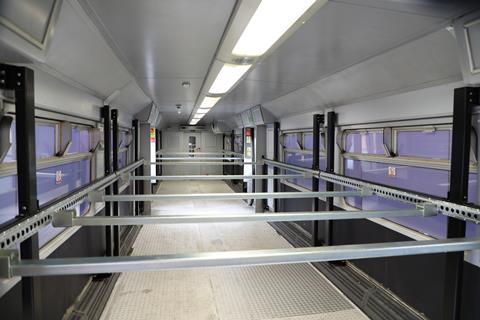
The demonstrator EMU has maximum speed of 160 km/h, enabling it to operate alongside passenger services, and it could operated in four, eight or 12-car formations
In a rival freight multiple-unit project leasing company Porterbrook and Rail Operations Group have fitted a Class 319 EMU with a diesel engine to provide full bi-mode operation.
Eversholt’s train is purely electric, but it has proposed a version equipped with batteries for low-speed last mile operation on sidings at up to 25 km/h. While this would not have the operational flexibility of a true bi-mode, Eversholt expects electric and battery to be simpler and cheaper than fitting a diesel engine, and more appropriate for a unit intended for fast main line services. The Class 321 can be hauled by a diesel locomotive if required.
Market
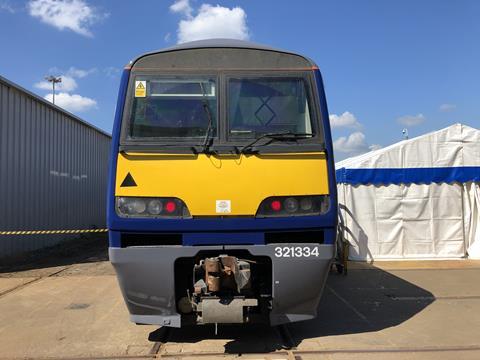
While future operating concepts are a matter for the end user, Eversholt said a market for 40 to 50 units across multiple operators is foreseen, if the concept can be shown to be competitive with road transport.
Sutherland said there is growing interest in decarbonisation from politicians and shippers, and Swift Express Freight provides an opportunity for electric railways to form a link in the delivery chain.
Road hauled is facing upwards cost pressures from factors include driver shortages, while the mileage operated by road vans continues to grow as increasing volumes of goods are ordered online. Some companies may also be willing to pay more for sustainable electric transport.
Sutherland said carbon-neutral electric trains could replace the longest leg of road deliveries, such as between ports and distribution hubs, and trains could also replace domestic flights. Vans can then be used for last mile deliveries, with the shorter road legs opening up the opportunity to use electric vehicles.



